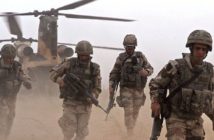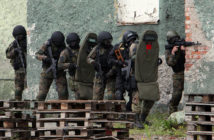NATIONAL POST
Thomas Joscelyn, National Post
A screengrab from an Al-Jazeera video broadcast shows Ayman al Zawahiri speaking on videotape. His younger brother Mohammed and his Egyptian Islamic Jihad are believed to have resumed their terrorist activities under al-Qaeda’s auspices. AFP/Getty Images
Sitting in his Abbottabad, Pakistan, compound just days before his demise in May 2011, Osama bin Laden surveyed the political turmoil in the Middle East. In a memo dated April 26, 2011, the terror master assessed his terrorist organization’s prospects for the future. From bin Laden’s perspective, the Arab Spring presented new opportunities for al-Qaeda and its virulent ideology.
Bin Laden surmised that “current conditions have brought on unprecedented opportunities and the coming of Islamic governments that follow the Salafi doctrine is a benefit to Islam.” (Salafists believe in an austere version of Islam, and believe that modern Muslim societies have veered from the appropriate path.)
While bin Laden branded the Muslim Brotherhood and like-minded organizations “half solutions,” he also believed that “there is a sizable direction within the Brotherhood that holds the Salafi doctrine, so the return of the Brotherhood and those like them to the true Islam is a matter of time.” Bin Laden urged his followers to avoid fighting the newly-installed Islamist regimes, and to instead steer them towards a more extreme position.
One year later, Canadian intelligence came to a similar conclusion. This past week, the National Post’s Stewart Bell reported on a declassified threat assessment authored by the Integrated Terrorism Assessment Centre (ITAC) in April 2012.
“The threat implications of the ‘Arab Spring’ in North Africa and the Middle East remain a concern, as terrorist groups attempt to take advantage of political unrest and replace current regimes with one[s] sympathetic to an extremist alternative,” the assessment reads.
It is true that al-Qaeda did not start the Arab Spring. Al-Qaeda and its ideology are not the dominant force throughout the Middle East. Nor should we conflate all Islamist groups under the al-Qaeda banner. But the terror network bin Laden founded has capitalized on the political unrest in a variety of ways.
Senior al-Qaeda operatives who were once imprisoned have been freed, breathing new life into the terrorist organization’s operations. And, just as bin Laden recommended, al-Qaeda-affiliated groups are pressuring Islamist governments to adopt more radical policies, often under the banner of Ansar al Sharia (“Partisans of Islamic Law”).
Consider this brief survey of the Arab Spring nations.
Ayman al Zawahiri, bin Laden’s successor as al-Qaeda’s emir, has thick roots inside Egypt. Before his merger with bin Laden prior to the Sept. 11, 2001, attacks, Zawahiri headed a group called the Egyptian Islamic Jihad (EIJ), which sought to overthrow Hosni Mubarak’s regime. The EIJ failed in that regard and Mubarak’s crackdown crippled the organization’s infrastructure. Most of the group’s leadership either fled Egypt or was imprisoned.
In the wake of the Egyptian revolution, however, the EIJ has experienced something of a revival. Numerous EIJ leaders have been freed from Mubarak’s notorious prisons and others have returned from their safe havens abroad. None of these EIJ leaders is more conspicuous than Ayman al Zawahiri’s younger brother, Mohammed al Zawahiri.
Prior to his capture in 1999, the younger Zawahiri managed the EIJ’s international clandestine terrorist operations. By then, the EIJ had already been working closely with bin Laden’s operation for years. Subsequent to his release from prison, Mohammed al Zawahiri has become something of a media star, going on Egyptian television to push his radical agenda, urging the Muslim Brotherhood-dominated government to implement an especially harsh version of sharia (Islamic law).
Mohammed al Zawahiri’s EIJ allies have founded new political groups, including Ansar al Sharia Egypt, to accomplish the same. While being coy about his ties to al-Qaeda the organization, the younger Zawahiri has defiantly proclaimed his allegiance to al-Qaeda’s ideology.
U.S. intelligence officials think that Mohammed al Zawahiri and his EIJ ilk have, in fact, resumed their terrorist activities under al-Qaeda’s auspices. They have refrained from plotting terrorist acts inside Egypt proper, but have been tied to operations in the Sinai Peninsula and elsewhere. Indeed, the Sinai has become a hotbed for al-Qaeda-inspired jihadism since the fall of Mubarak’s regime.
The newly-freed EIJ contingent has branched out into Libya as well. One of Ayman al Zawahiri’s subordinates, Muhammad Jamal al Kashef, set up terrorist training camps inside Egypt and Libya after he was released from prison in 2011. Kashef’s trainees reportedly took part in the Sept. 11, 2012, terrorist attack on the U.S. Consulate in Benghazi, Libya. Four Americans, including the U.S. Ambassador, were killed. And Kashef has reportedly admitted to working with a militia called Ansar al Sharia in Benghazi, which was also involved in the attack on the U.S. Consulate.
Al-Qaeda’s gains in Syria may be the most worrisome of all the Arab Spring nations
Mohammed al Zawahiri orchestrated the anti-American protest outside of the U.S. Embassy in Cairo earlier that same day. The Cairo protest was a pro-al-Qaeda affair, as the al-Qaeda flag was raised in the place of the stars and stripes, and protesters chanted, “Obama, Obama! We are all Osama!”
Kashef and the Egyptians are not the only al-Qaeda allies who have set up shop inside post-Qaddafi Libya. According to a report authored by the U.S. Defense Department and the Library of Congress in August 2012, al-Qaeda has dispatched senior operatives to eastern Libya, where they have established a robust network. They have partnered with like-minded militia groups to turn large parts of Libya into a lawless cauldron.
In Tunisia, as in Egypt, formerly imprisoned al-Qaeda operatives have gone back to work. An al-Qaeda-allied group named Ansar al Sharia Tunisia has grown in stature and is headed by an al-Qaeda-affiliated terrorist named Abu Iyad al Tunisi. Ansar al Sharia Tunisia orchestrated the Sept. 14, 2012 assault on the U.S. Embassy in Tunis. Four people were killed in the attack, which also caused millions of dollars in damage. As in Egypt, Ansar al Sharia is trying to force the Tunisian Islamist government into adopting a stricter version of Islamic law.
Al-Qaeda’s new presence in Egypt, Libya and Tunisia has benefited from an established presence in Western Africa, where al-Qaeda’s affiliates and allied groups have become more potent since bin Laden’s demise. Al-Qaeda in the Islamic Maghreb (AQIM) controls a large part of northern Mali. And AQIM’s tentacles extend into neighboring countries where similar groups, such as Boko Haram in Niger, have greatly expanded their operations.
Of all the Arab Spring nations, al-Qaeda’s gains in Syria may be the most worrisome. A rebellion against Bashar al Assad’s regime that was not begun by al-Qaeda has quickly evolved into one of al-Qaeda’s chief warzones. Jihadists around the world long to fight in Syria. Al-Qaeda’s arm there is called the Al Nusra Front, which has been designated by the U.S. Government as a terrorist organization. According to the U.S. State Department, the same al-Qaeda terrorist, known as Abu Bakr al Baghdadi, “control(s)” both the Al Nusra Front and al-Qaeda in Iraq.
The growth in the Al Nusra Front’s operations is alarming. The al-Qaeda affiliate has become the most effective and lethal part of the Syrian insurgency. Since late 2011, according to the U.S. State Department, the Al Nusra Front has claimed responsibility for more than 600 attacks. There had been no suicide attacks in Syria until late 2011. In just over one year since, the Al Nusra Front has executed more than 40 such operations.
Western intelligence officials are greatly concerned about the possibility of Assad’s chemical weapon arsenal falling into al-Qaeda’s hands.
Osama bin Laden is dead, but al-Qaeda is very much alive. Al-Qaeda’s CEO was right: the Arab Spring has granted the terror network “unprecedented opportunities.”
National Post
Thomas Joscelyn is a senior fellow at the Foundation for Defense of Democracies and senior editor of The Long War Journal.
Posted in: Full Comment Tags: Al-Qaeda, Arab Spring, Politics
.







